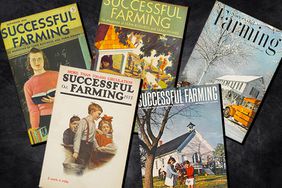:max_bytes(150000):strip_icc()/7018539art-34dd6f6578ec4233bb51368cbbd90f5e.jpg)
Illustration by Matt Wood
The problem:
My wife and I are both 75 years old and we own 700 acres with no debt. We have more income than we could have ever imagined when we started farming, and we don’t need it all. One child is farming with us, so we have time and financial freedom. Every year we think about gifting, but we never do anything big. Sometimes I think we should give big and sometimes I think we shouldn’t do anything at all. What are the rules or the advantages and disadvantages of gifting?
– Submitted by email from J.B.
Solutions:
Here are several options — including why, when, how, how much, and to whom — to consider when you make these decisions.
Why give?
I will assume you love your children. They probably could use the money more now for their family or business than when they are 65. It could help your estate from growing into an estate tax problem and, depending on the nature of the gift, it may reduce your income taxes.
When to give?
Is this a one-time gift or annual gift? It is important to communicate either way to avoid unrealistic future expectations from your children. Also, giving simply when you observe they need it can be really appreciated.
Assets to give?
Gifts should be in line with your succession plan. Cash is simple; it’s not deductible for you and it’s not taxable to them. You can give shares or percentages of a larger asset, but be careful not to give away something now you regret giving later.
Gifting grain would have some income tax advantages if the receiver was in a lower tax bracket, or if the grain was held more than one year and income was considered a long-term capital gain rather than ordinary income.
How much can you give?
Nothing to everything. The annual exclusion allows each person to gift $17,000 every year to an unlimited number of people.
Confusion often results when dealing with a large gift that exceeds $17,000 because people believe they can’t do that. However, a married couple could give a child and spouse a combined $68,000 a year. You could give a big gift by deeding a parcel of land.
Sometimes the term “gift tax” scares people. No tax is due, but the giver would file a 709 gift tax return, which will use some of your estate tax credit while you are living. Not a problem. You could give the remaining interest in land away using a life estate deed, which will guarantee the result of where the land is going, but you retain the life income.
Give to whom?
Does everyone have to get the same amount at the same time? Do you include the in-laws? Sometimes gifts to grandchildren get tricky if family sizes are very different. Do you divide that per stirpes or per capita? In other words, does each family or each grandchild get the same amount?
Before making a big gift, ask yourself a few “what-if” questions. What if a child predeceased you after receiving a gift? What if a grandchild went wayward after receiving a gift? What if there was a divorce? What if a child was not thankful?
Gifting can be awesome. Many times both the giver and the receiver are blessed. On the other hand, I have seen both the giver and the receiver handle things poorly and precipitate bitter feelings and unintended results. I personally think gifting is fun, but sometimes it can get a little complicated, especially as the gifts get larger.
Myron Friesen is co-owner of Farm Financial Strategies in Osage, Iowa. Over the past 23 years, he has worked exclusively with farm families across the Midwest to develop farm transition strategies. Friesen grew up on a Mountain Lake, Minnesota, farm. He owns and operates a 1,700-acre crop and livestock farm with his wife and four children. friesen@farmestate.com









